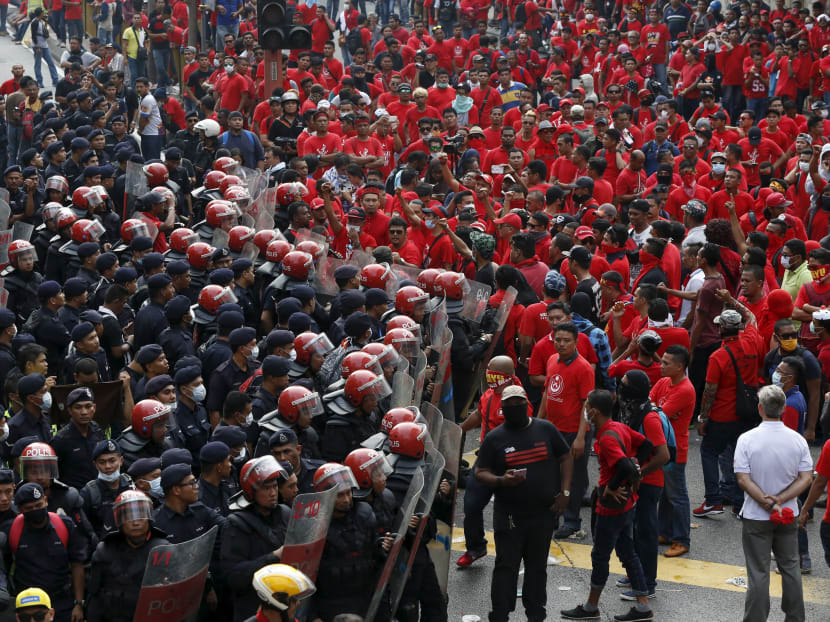Racial problems worsening, analysts say after anti-Chinese slurs at ‘red shirt’ rally
KUALA LUMPUR — Race relations in Malaysia remain shaky amid growing anti-Chinese sentiment, analysts have noted after yesterday’s (Sept 16) “red shirt” rally that saw the Chinese being called “babi” (pigs) and told to “balik Cina” (Go back to China).

Riot police protect the entrance to Chinatown from "Red Shirt" demonstrators during a rally to celebrate Malaysia Day and to counter a massive protest held over two days last month that called for Prime Minister Najib Razak's resignation over a graft scandal, in Malaysia's capital city of Kuala Lumpur September 16, 2015. Photo: Reuters
KUALA LUMPUR — Race relations in Malaysia remain shaky amid growing anti-Chinese sentiment, analysts have noted after yesterday’s (Sept 16) “red shirt” rally that saw the Chinese being called “babi” (pigs) and told to “balik Cina” (Go back to China).
The insults were hurled by Malay protesters against ethnic Chinese journalists at the government-sanctioned demonstration on Malaysia Day that saw placards with slogans like “Malaysia belongs to the Malays”, “Defend Malay rights”, and “Get rid of SJKC”, referring to Chinese vernacular schools.
“While ethnic relations have always smouldered in Malaysia, they have worsened as perceptions have grown of Chinese ‘betrayal’ in GE13, participation in Bersih 4.0, and other events,” Professor William Case from the Department of Asian and International Studies at City University of Hong Kong told Malay Mail Online.
The analyst said, however, that Malaysia can avoid a full-blown riot and killings like what had happened in Jakarta in 1998 as long as restraint prevailed, noting that UMNO deputy president Muhyiddin Yassin and Kelantan prince Razaleigh Hamzah both advised against yesterday’s pro-Malay demonstration.
Centre for Policy Initiatives chief Dr Lim Teck Ghee said the “red shirt” rally showed that the constant blame the races and the tone of racial discourse in the press and social media has had an impact.
“We can see this as a manifestation of ultra-nationalism with rationality and civil behaviour suspended while the emotions spill over or run wild, whipped up by politicians making political capital out of it,” Dr Lim told Malay Mail Online.
A female ethnic Chinese journalist was heckled and called “Cina gila babi (Crazy Chinese pig)” by the crowd at the “Red Shirt” rally while trying to interview protesters in Petaling Street before being chased away.
The police were also forced to extricate two male ethnic Chinese journalists who were similarly called “babi” from another rally gathering point when demonstrators became angry when asked to provide examples of Malays being insulted.
Muslims consider pigs unclean and Malay-Muslims often use “babi” as a derogatory term. “Balik Cina” is a common insult thrown against the ethnic Chinese who are deemed immigrants, despite having lived in Malaysia for generations.
The pro-Malay “red shirt” rally also took place after a racially-tinged riot at Low Yat Plaza in the city centre last July that saw the Malay mob injuring five ethnic Chinese men.
According to police estimates, about 50,000 people attended the “Red Shirt” demonstration in various parts of the city centre here yesterday, where water cannons were briefly deployed against protesters who refused to leave Petaling Street. The main gathering at Padang Merbok, however, ended peacefully.
Merdeka Center chief Ibrahim Suffian said the rally showed that race relations in multicultural Malaysia remained a “work in progress”.
“(Yesterday’s) events probably indicate that durable positive relations can only come by if we had more statesmen rather than politicians,” Mr Ibrahim said.
The independent pollster also noted that the rally showed UMNO has the ability to muster its supporters.
“The fact that Nik Abduh also showed up also indicates that the Malay right wing is by no means confined to just UMNO,” he said, referring to Mr Nik Mohamad Abduh Nik Abdul Aziz, Youth chief of Islamist opposition party PAS.
Some protesters at the “Red Shirt” rally have accused the Chinese of stealing the rights of the Malays and claimed that the ethnic minority controlled the economy.
Dr Oh Ei Sun, a senior fellow at S Rajaratnam School of International Studies at Singapore’s Nanyang Technological University, said it would appear superficially that the demonstration did not bode well for race relations in Malaysia.
“But we must keep this event in perspective, namely a small group of organisers trying to curry favour with the powers that be (albeit not successfully, as the powers that be also does not officially approve of their childish antics) by toying with racial sentiments,” Dr Oh said.
“Most Malaysians see through the charade and are not of the same wavelength as these simpleton wannabes,” the analyst added. MALAY MAIL ONLINE









